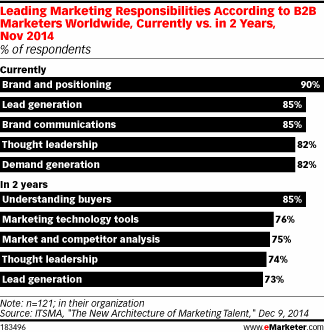Like many people, I like to reflect on my career, especially my industry and company. Recently, I came to the conclusion that it’s never been a better time to be a B2B marketer.
As a B2B marketer, I think we’ve long been considered a second-class citizen to just about everyone else — from B2C marketers to sales teams.
For years, B2B has taken something that was developed for B2C and try to adapt it so it could work for us. This is everything from ad networks like Facebook, measurement tools like conversion tracking, and even processes/models like last click attribution.
The problem is, they don’t work (well) for B2B as the buying is so much more complex with multiple decision makers involved in deals, long purchase/decision paths, and ultimately offline revenue transactions via CRM. B2C-focused tools completely ignore these problems, which is fundamentally why B2B has been left with a lot of “I don’t know” answers to questions from leadership and why they pat themselves on the back for over-delivering a lead goal when sales was struggling to meet revenue.
But not anymore. We’re finally getting the tools and credit we deserve and it’s all thanks to the marketing technology revolution, especially marketing operations. Just look at our SaaS marketing technology stack: so much of it is specific to B2B.

This revolution didn’t happen overnight, nor could it have. Smart marketing is reliant on data. Pure and simple. So what data is driving the B2B marketing technology revolution? Marketing operations, specifically the focus on revenue.
The best B2B marketers have realized that the CRM is the most critical data source at their disposal. Sure, CRMs are sales tool, but the data is for marketers. That’s because it holds all the downstream performance metrics like revenue. This is important because revenue data tells marketers about what customers are willing to pay for, which is so much different than what a person is willing to provide their email address for (leads).
Revenue data brings B2B marketers closer to fully understanding their customers desires with a value attached to it. What is more telling than a prospect putting budget (and their career) behind an investment like B2B tools/software? When you look at it this way, it’s not a surprise that eMarketer found that B2B marketers expect their responsibilities to shift from brand and lead generation to understanding buyers and marketing technology tools.

With the explosion of the SaaS market, there’s been an explosion of B2B companies needing better marketing tools that help them drive revenue. No longer is the mindset, “How do I get a little more out of the same budget I’ve had for years.” It’s about marketing driving not just meaningful growth, but explosive growth. It’s the pipeline marketing way.
As a result, we’re finally getting marketing technology solutions built specifically for B2B companies. It’s like the famous ‘1984’ commercial from Apple to launch the Mac. We’re the woman, standing up to the culture of martech acceptance.
It’s happening in all areas of B2B marketing too. Customer success platforms like Influitive are making customers happier and turning them into a key demand audience. Account-based marketing systems like Demandbase and Terminus are aligning marketing with outbound sales. Attribution solutions like our own Bizible which is the marketing attribution solution for B2B. Even ad networks like LinkedIn are now providing firmographic and job information as part of standard targeting criteria.
Marketing technology is why I’m proud to be a B2B marketer and you should be too.
This article was syndicated from Business 2 Community: The Golden Age of B2B Marketing Is Here, What You Need To Know
More Sales & Marketing articles from Business 2 Community:





